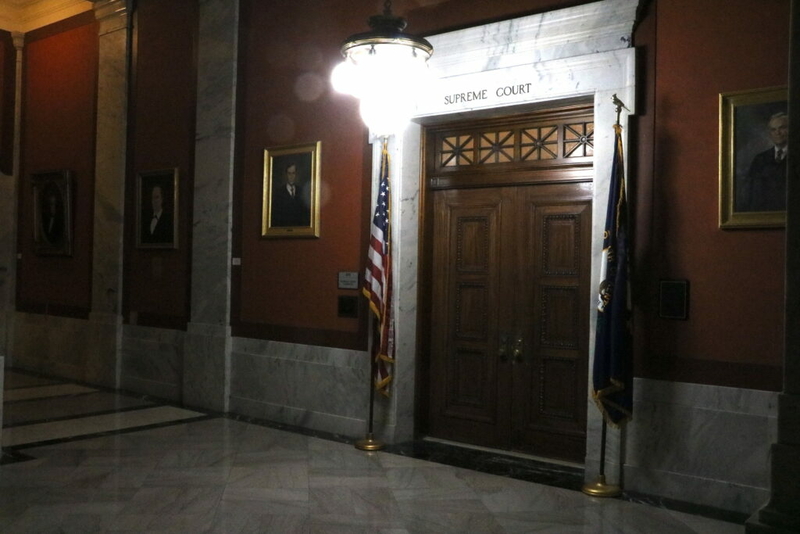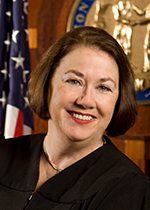Legislature approves ‘random’ venue changes for Kentuckians challenging state laws, decisions

FRANKFORT — Kentuckians challenging the constitutionality of state laws and executive branch decisions could move their lawsuits across the state at random, under a Republican-backed bill approved by the legislature last week.
Lawyers representing the state also would be entitled to random changes of venue.
The sponsor, Sen. Jason Howell, R-Murray, called Senate Bill 126 “clean up” legislation building on a law Republican supermajorities passed in 2021 that allowed lawsuits against the state to be filed outside Franklin County Circuit Court.

SB 126 would allow the plaintiff or defendant to request a change of venue in a constitutional case and have the clerk of the Kentucky Supreme Court pick a new circuit court “through random selection.”
The attorney general — currently Republican Daniel Cameron who’s running for governor — could also intervene in a case as a defendant and request a random change of venue.
Howell said the bill was about allowing plaintiffs or defendants the opportunity to get out of “an unfavorable venue.”
“It’s a little bit of a roll of the dice with the blind draw on that, but at least gives them the option,” he said.
The leader of an organization representing Kentucky’s circuit judges told the Lantern that the bill raises practical issues.

Kenton Circuit Judge Patricia Summe, president of the Kentucky Circuit Judges Association, said there would be an increase in workload for some judges on the receiving end of random court selection with the extra work falling especially burdensome on those who are a circuit’s only judge.
Random changes of venue also could inconvenience lawsuit participants, Summe said, by forcing them to travel long distances.
A floor amendment by House Majority Whip Jason Nemes of Louisville would have narrowed where a case could be moved to only adjacent counties, but that amendment was not incorporated into the bill that finally passed.
Howell said cases involving constitutional matters were “a really, really low volume area of law” and wouldn’t be a burden on judges because of their low frequency.
But former Kentucky Supreme Court Justice Bill Cunningham told the Lantern that practical concerns about the bill are valid, as a case in Western Kentucky could hypothetically land in a courtroom 400 miles to the east.
He said there’s always “a dark cloud of suspicion” when the state legislature is considering making changes to the judicial branch.

“The people, the public, should know whenever the legislature starts tinkering with the court system, they’re not happy with what the court system is doing to their laws,” Cunningham said. “The court system normally is doing exactly what it’s supposed to do, and that is keep a check and balance in our government.”
He said there could be significant differences in expertise and experience, such as with cases involving agriculture, with judges in agrarian areas compared to judges in Louisville or Lexington, and a random change of venue could play a substantial role in how a case is determined.
“It’s not to be taken lightly,” Cunningham said. “You get rid of a judge … this is a judge that was duly elected to serve the people of that venue.”
Howell said he had consulted with judges in Western Kentucky who didn’t have a problem with the legislation.
“It could be a burden if this was a high volume area of law, but it’s a really, really low volume area of law.”
The law enacted by the legislature in 2021 sought to curtail the influence of Franklin County Circuit Court, which traditionally hears cases involving state government because Frankfort is the seat of state government and where most of the officials and lawyers involved in challenges to state decisions are based.
The 2021 law required plaintiffs challenging the constitutionality of laws, regulations or executive orders to sue in their home county instead of taking the case to Franklin County.
Republicans have often complained about decisions in particular by Franklin Circuit Judge Phillip Shepherd. An attorney who was general counsel to Republican Agriculture Commissioner Ryan Quarles unsuccessfully ran last year against Shepherd. Quarles is also a Republican candidate for governor.
Senate President Robert Stivers, R-Manchester, held a fundraiser for Republican challenger Joe Bilby in what turned into an extraordinarily expensive judicial race that saw more than $1 million combined spent by both candidates and political action committees supporting the candidates.
Legislative debate
During this year’s venue debate, lammakers referenced a past Kentucky Supreme Court decision and past GOP criticism of Shepherd as the bill moved through the GOP-controlled legislature.
On the House floor, Rep. Lindsey Burke, D-Lexington, said Franklin Circuit judges have developed expertise in constitutional matters.
“They have much more experience in interpreting legislation than any other circuit in the state,” Burke said. “It seems plain to me that this is an attempt to do an end run around the circuit court in Franklin County.”
When the bill was being voted on in the Senate in late February, Senate President Robert Stivers mentioned a state Supreme Court ruling in December as an example of why SB 126 is needed.
The Supreme Court in that decision unanimously rejected Democratic Gov. Andy Beshear’s claim that laws enacted by the legislature unconstitutionally curbed his emergency powers during the COVID-19 pandemic in 2021.
Beshear had sued the legislature over such bills while the body was in session, and Shepherd stopped the enforcement of the legislation through a temporary injunction. In a veto message, the governor said one of the bills passed by the legislature violated the temporary injunction and “could subject the body to a contempt of court citation.”
The state’s highest court ruled that the Kentucky Constitution granted the legislature immunity from such lawsuits.
“People want to talk about overreach and abuse? Boy, that’s one. Because guess what? In a 7-0 opinion, the Supreme Court said the governor was wrong,” Stivers said. “Why did he run down to Franklin Circuit Court? Why does that always get said? Because he thought he could hold the legislature in contempt.”








